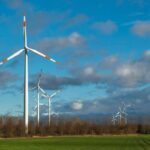As Germany heads for elections on February 23, gray winter weather has become a hot topic in election campaigns due to its impact on the country’s fragile green energy transition.
Electricity prices have risen temporarily twice in recent months in Europe’s largest economy due to a lack of sunlight and wind energy to power solar panels and turbines.
This phenomenon – dubbed a “dark lull” – briefly sent prices rising to €936 ($972) per megawatt hour on December 12, twelve times the average of the previous weeks.
Conservative opposition leader Friedrich Merz, whose CSU/CDU party is widely expected to win, has seized on the issue to attack center-left Chancellor Olaf Scholz.
Regarding Europe’s interconnected energy market, Merz told Scholz that his “energy policies are setting his teeth on edge throughout the EU, which is very angry with Germany.”
That comment was rejected by the Green Party, which has long been the political driving force behind Germany’s shift away from fossil fuels and nuclear power and toward clean renewables.
Green Party Vice Chancellor and Economy Minister Robert Habeck responded that previous governments led by the CDU and CSU under Angela Merkel were “blind” to Germany’s energy challenges.
To help fight climate change, Germany has pledged to phase out fossil fuels, cut greenhouse gas emissions by 55 percent by 2030 compared to 1990 levels, and become carbon neutral by mid-century.
– “At the limit” –
Recent price increases have prompted some of Germany’s largest energy-consuming companies to limit or even temporarily stop their production.
In the December 12 incident, Germany bought electricity from the European Energy Exchange in Leipzig, causing prices to rise in neighboring countries.
Meanwhile, the German energy sector is ringing alarm bells.
Markus Kreber, president of RWE, the largest energy supplier, said recent declines in renewable energy supply “could not have been controlled on another day with a higher peak load, for example in January.”
He warned that the system is currently operating “at its maximum limits.”
The situation quickly stabilized after the recent decline as renewables production picked up again, and households and most businesses remained protected from daily price fluctuations through fixed tariffs.
The Schulz government has defended the shift to green energy despite the occasional “temporary phenomenon” of dark lulls that can send prices higher in the spot market.
“There are phases when the sun shines a lot, the wind blows a lot, and electricity is produced very cheaply in Germany, which is then happily exported and supplies our neighboring countries with electricity,” spokesman Stephen Hebstreit said.
Renewables are becoming an increasingly important part of Germany’s energy mix, accounting for an average of 60% of its electricity production so far this year.
Conventional energy sources are being curtailed, with coal-fired power stations gradually closing after the last three nuclear power stations were taken off the grid last year.
– Political paralysis –
But many experts say the world’s third-largest economy cannot afford such supply fluctuations when it already suffers from a lack of competitiveness in other areas.
Analysts say Germany needs to increase energy storage capacity as well as develop other sources of production, such as gas and hydrogen, to make up for the shortfall when necessary.
“If the state creates a good regulatory framework, it is possible to avoid shortages by investing in storage and flexibility in supply,” Georg Zachmann, an energy and climate specialist at the Bruegel Research Center, told AFP.
But he said there was “major concern that the framework will not be sufficient to rapidly develop” the necessary infrastructure.
“Building a wind power plant takes seven years on average, but building a liquefied natural gas plant only takes seven months,” said Claudia Kimfert, an energy expert at the DIW Institute. “It should be the other way around.”
Currently, Germany faces months of political paralysis following the collapse of Schulz’s tripartite coalition government.
The coalition’s demise also means the cancellation of a key bill projecting to build a network of gas and hydrogen power stations as part of the transition away from coal.
It will likely take several months for a new government to be formed after elections scheduled for February, and then to set its own energy policy.
Merz, the front-runner, pledged to study a return to nuclear energy.
jpl/smk/jsk/fz/rl




